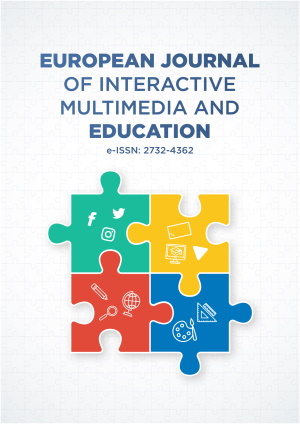Research Article
Exploring the potential of YouTube videos towards enhancing achievement and retention of undergraduate students in environmental education
More Detail
1 Department of Science Education, Federal University Kashere, Gombe State, NIGERIA2 Department of Science and Environmental Education, University of Abuja, Abuja, NIGERIA* Corresponding Author
European Journal of Interactive Multimedia and Education, 4(1), January 2023, e02302, https://doi.org/10.30935/ejimed/13190
Submitted: 22 January 2023, Published: 12 April 2023
OPEN ACCESS 2373 Views 4885 Downloads
ABSTRACT
The poor performance of students in environmental education calls for different approaches towards teaching of the course of which the incorporation of technology is one of them. Hence, this study investigated the effect of YouTube-supported instructional strategy on academic achievement of environmental education students in University of Abuja, Nigeria. The study adopted a one group pre-/post-test quasi-experimental non-equivalent, non-randomized control group design. The population of the study comprised of 768 year three undergraduate students of Department of Science and Environmental Education, Faculty of Education at University of Abuja. A purposive sampling technique was used to select 126 year three students of environmental education in Department of Science and Environmental Education offering EED 322: Natural ecosystem. The instruments for the study were environmental education achievement test (EEAT) and YouTube videos used as test and treatment instruments, respectively. The instruments were validated by experts in the field of educational technology and environmental education. EEAT was tested using split-half method of reliability and a co-efficient value of 0.89 was obtained using Pearson product moment correlation. The findings revealed that the students performed better in the post-test (mean gain=40.01) and retention test (mean loss=2.01) after exposure to tailored YouTube videos matching their lecture contents and that a significant difference was found in the students’ achievement (t=5.21, p=.000) and retention scores (t=2.44, p=.000). It was therefore recommended, amongst others, that lecturers should adopt the use of YouTube videos in teaching and learning for they are effective.
CITATION (APA)
Mohammed, I. A., & Ogar, S. I. (2023). Exploring the potential of YouTube videos towards enhancing achievement and retention of undergraduate students in environmental education. European Journal of Interactive Multimedia and Education, 4(1), e02302. https://doi.org/10.30935/ejimed/13190
REFERENCES
- Al-Zboun, M. S., Al-Ghammaz, S. A., & Al-Zboun, S. A. (2018). The impact of the use of YouTube and Facebook on students ‘academic achievement in geography course at the University of Jordan for the bachelor’s degree. Modern Applied Science, 12(3), 164-174. https://doi.org/10.5539/mas.v12n3p164
- Azor, R. O., Asogwa, U. D., Ogwu, E. N., & Apeh, A. A. (2020). YouTube audio-visual documentaries: Effect on Nigeria’s students’ achievement and interest in history curriculum. The Journal of Educational Research, 113(5), 317-325. https://doi.org/10.1080/00220671.2020.1819182
- Beji, B. D., & Saidu, A. (2021). Impact of YouTube-based instruction on students achievement and retention in school workshop management in colleges of education in north central Nigeria. International Journal of Science and Technology, 9(4), 19-25. https://doi.org/10.24940/theijst/2021/v9/i4/ST2104-017
- Campillo-Ferrer, J. M., & Miralles-Martínez, P. (2021). Effectiveness of the flipped classroom model on students’ self-reported motivation and learning during the COVID-19 pandemic. Humanities and Social Sciences Communications, 8, 176. https://doi.org/10.1057/s41599-021-00860-4
- Chenail, R. (2011). YouTube as a qualitative research asset: Reviewing user generated videos as learning resources. The Qualitative Report, 16(1), 229‑235. https://doi.org/10.46743/2160-3715/2011.1048
- Duncan, I., Yarwood-Ross, L., & Haigh, C. (2013). YouTube as a source of clinical skills education. Nurse Education Today, 33(12), 1576‑1580. https://doi.org/10.1016/j.nedt.2012.12.013
- Ebied, M. M., Kahouf, S. A. A., & Abdelrahman, S. A. (2016). Effectiveness of using YouTube in enhancing the learning of computer in education skills in Najran University. International Interdisciplinary Journal of Education, 5(3), 619-625. https://doi.org/10.12816/0035903
- Falode, O. C., & Mohammed, I. A. (2023). Improving students’ geography achievement using computer simulation and animation packages in flipped classroom settings. Journal of Digital Educational Technology, 3(2), ep2303. https://doi.org/10.30935/jdet/13106
- Felicia, E. O., & Mumini, A. A. (2019). Effect of YouTube on performance of secondary school students in biology concepts in Ikwerre Local Government Area of Rivers State. International Journal of Engineering Science Invention, 8(8), 54-61.
- Gambari, A. I., & Adamu, Z. E. (2008). Impact of videotaped instruction on the teaching, learning and retention of primary school teachers in Minna, Niger State, Nigeria. Journal of Science, Education and Technology, 1(2), 41-48.
- Gambari, A. I., Falode, C. O., & Adegbenro, D. A. (2014). Effectiveness of computer animation and geometrical instructional model on mathematics achievement and retention among junior secondary school students. European Journal of Science and Mathematics Education, 2(2), 127-146. https://doi.org/10.30935/scimath/9406
- Kayii, N. E., & Dambo, B. I. (2018). Effect of blended learning approach on business education students’ achievement in elements of business management in Rivers State University, Nigeria. International Journal of Innovative Information Systems & Technology Research, 6(1), 38-48.
- Kosterelioglu, I. (2016). Students’ views on learning environments enriched by video clips. Universal Journal of Educational Research, 4(2), 359-369. https://doi.org/10.13189/ujer.2016.040207
- Olasina, G. (2017). An evaluation of educational values of YouTube videos for academic writing. The African Journal of Information Systems, 9(4), 232-261.
- Stevenson, R. B. (2007). Schooling and environmental education: contradictions in purpose and practice. Environmental Education Research, 13(2), 139-153. https://doi.org/10.1080/13504620701295726
- UNESCO. (1978). Final Report of Intergovernmental Conference on Environmental Education, 14-26 October 1977. Organized by UNESCO, in co-operation with UNEP at Tbilisi (USSR).

 The articles published in this journal are licensed under the CC-BY Creative Commons Attribution International License.
The articles published in this journal are licensed under the CC-BY Creative Commons Attribution International License.